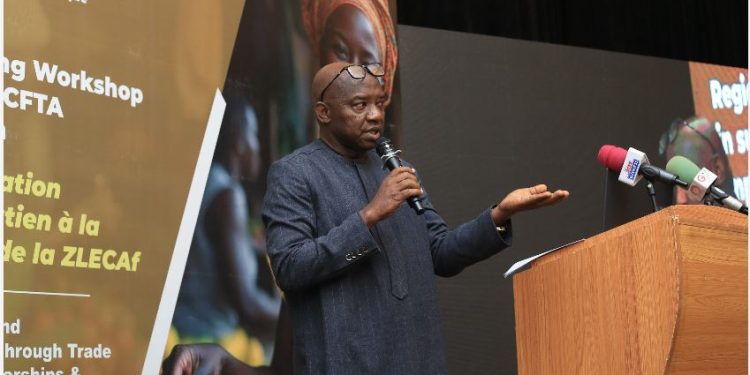Mr. Wamkele Mene, Secretary-General of the African Continental Free Trade Area (AfCFTA) Secretariat, has emphasized that digital technology and inclusive value chains are pivotal to integrating Africa’s economies into a unified and dynamic market.
Speaking at a regional workshop in Accra on AfCFTA implementation, Mr. Mene highlighted the role of Africa’s connected youth in leveraging the continent’s growing digital economy.

The workshop addressed barriers such as non-tariff and technical obstacles to trade while equipping MSMEs with strategies to navigate the evolving trade landscape effectively.
Mr. Mene pointed to the transformative potential of Africa’s digital economy, projected to create vast opportunities in e-commerce, particularly for women- and youth-led cross-border businesses, as the consumer market approaches $2.5 trillion by 2030.
He further noted that investing in digital infrastructure and the AfCFTA protocol on digital trade would establish the legal framework to accelerate intra-African trade and create self-employment opportunities for the continent’s youth.
“It provides other AfCTA protocols, such as those on investments, intellectual property, and competition policy, ensuring a cohesive approach to trade facilitation. Together, these protocols enable the development of a digital single market, as envisioned by the AU Digital Transformation Strategy for Africa. By 2030, this unified digital space will bolster the physical free trade area, enhancing trade efficiency and inclusivity,” he said.
The Secretary-General noted that protocols on digital trade set the groundwork for articulating a common African position in negotiating favourable outcomes with global trade partners, ensuring that the continent’s economic interests were protected and advanced.
Mrs. Madam Naa Densua Aryeetey, President, of Ghana’s Gender Subcommittee, Women in Cross-Border Trade, said access to finance, security, and safety was a major limitation to intra-continental trade.
She called for a conducive business regulatory environment for the women to be able to play their role in the AfCTA.
The President said that although the Trade Facilitation Agreement under the AfCTA framework was gender-neutral, some measures benefited women, but the women were unaware of them.
She noted that trade facilitation measures were very important, such as consultation with traders and allowing them to comment on trade-related regulations.
Mr. Mamadou Biteye, Executive Secretary of, the African Capacity Building Foundation (ACBF), said bridging the intra-African market would foster economic growth and create opportunities within the continent.
He urged trade ministries across Africa to implement the needed policies to complement efforts by the AfCFTA secretariat to enhance capacity for trade facilitation and create an ecosystem where innovation can thrive.
The Executive Secretary said the AfCFTA was a trade facilitation programme and a platform for transformative change on the African continent.
























































![[FREE FREE MONEY] Predict and Win a Guaranteed GH¢200 From Us EVERY WEEK](https://wordpress.ghanatalksradio.com/wp-content/uploads/2022/02/Predict-and-Win-Final-09-03-2021-218x150.jpg)
![[Predict & Win – 8th/Oct.] WIN A Guaranteed ¢200 From Us This Week](https://wordpress.ghanatalksradio.com/wp-content/uploads/2021/10/maxresdefault-16-218x150.jpg)
![[Predict & Win – 2nd] WIN A Guaranteed ¢200 From Us This Week](https://wordpress.ghanatalksradio.com/wp-content/uploads/2021/09/maxresdefault-50-218x150.jpg)
![[Predict & Win – 25th] WIN A Guaranteed ¢200 From Us This Week](https://wordpress.ghanatalksradio.com/wp-content/uploads/2021/09/maxresdefault-36-218x150.jpg)
![[Predict & Win – 18th] WIN A Guaranteed ¢200 From Us This Week](https://wordpress.ghanatalksradio.com/wp-content/uploads/2021/09/maxresdefault-23-218x150.jpg)







![[National cathedral] See full list of churches that have contributed since 2018](https://wordpress.ghanatalksradio.com/wp-content/uploads/2020/09/Ghana-National-Cathedral-GhanaTalksRadio-100x70.jpg)



